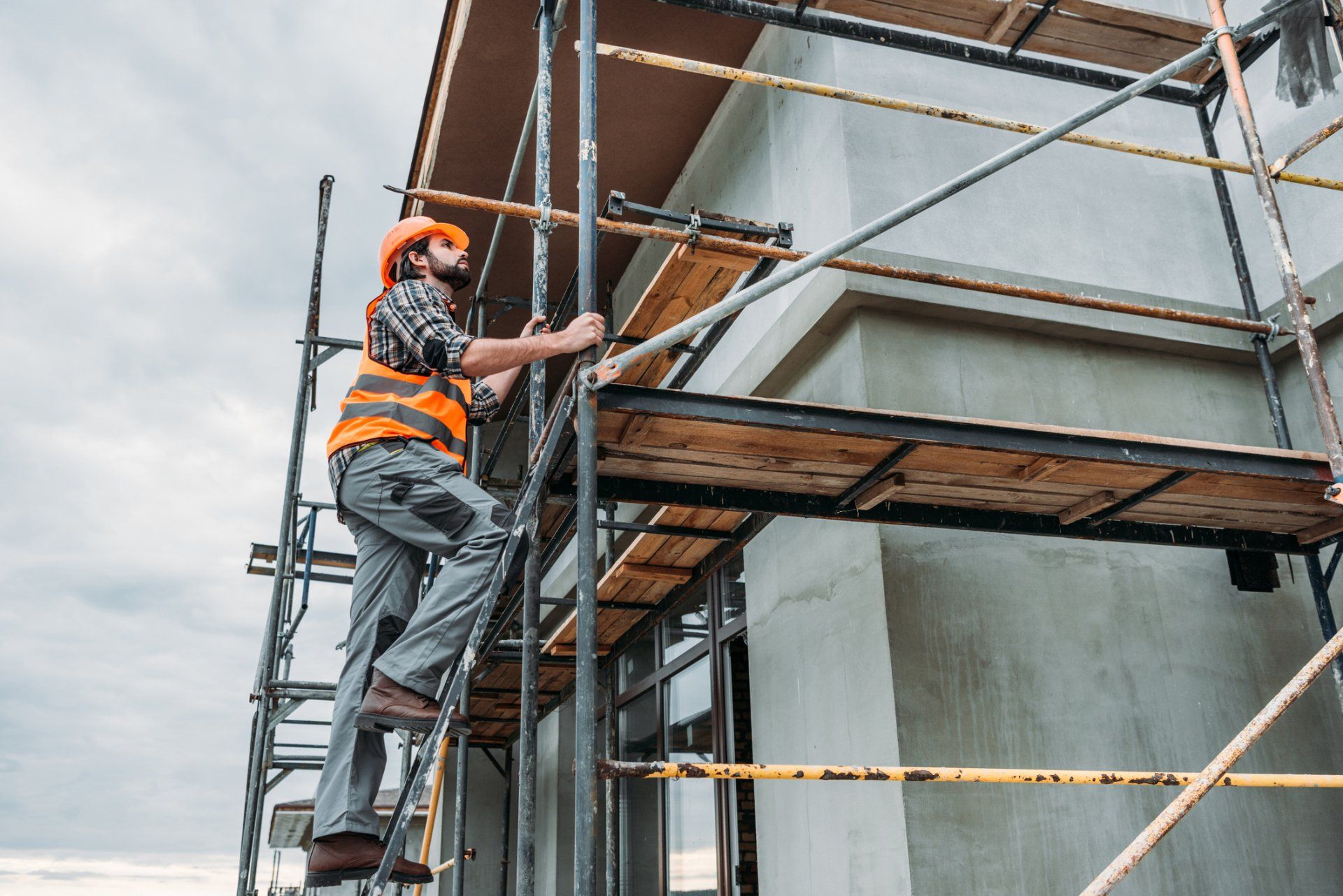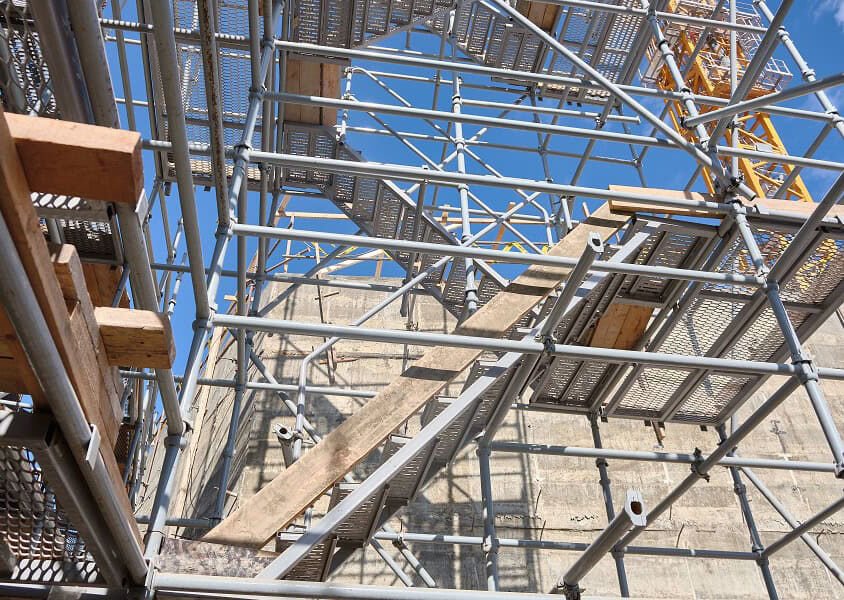Dependable Domestic Scaffolding for Homeowners in Need of Safe Renovations
Dependable Domestic Scaffolding for Homeowners in Need of Safe Renovations
Blog Article
Checking Out the Numerous Sorts Of Scaffolding Used in Construction Projects
The construction industry depends greatly on numerous kinds of scaffolding to satisfy details job needs, each offering distinct benefits and applications. Typical framework scaffolding supplies a durable structure for basic tasks, while put on hold scaffolding is crucial for work on skyscraper frameworks.

Conventional Framework Scaffolding
Conventional structure scaffolding is just one of one of the most extensively utilized approaches in the building market because of its robustness and adaptability. This system contains vertical and horizontal frameworks that are set up to create a stable platform for materials and employees. The primary elements consist of upright articles, horizontal journals, and diagonal dental braces, which with each other supply a solid framework that can support substantial tons.
Among the essential benefits of conventional framework scaffolding is its versatility to different building jobs, ranging from property buildings to large commercial structures. The modular layout allows for easy setting up and disassembly, making it effective for both temporary and lasting projects. Additionally, the system can be tailored in elevation and width, accommodating different building styles and website conditions.
Safety is extremely important in scaffolding applications, and conventional structure systems are geared up with guardrails and toe boards to stop drops and guarantee employee defense. Additionally, normal assessments and adherence to safety and security regulations are important in preserving the stability of the scaffold. On the whole, standard structure scaffolding stays an essential choice in the building sector, giving a dependable platform for labor and improving overall job effectiveness

Suspended Scaffolding
Put on hold scaffolding provides a distinct service for construction tasks that need access to raised surfaces, particularly in situations where typical framework scaffolding may be not practical. This sort of scaffolding is commonly suspended from the roofing system or top levels of a structure, making use of a system of systems, wheels, and ropes to develop a functioning area that can be readjusted to numerous elevations.
Among the key benefits of put on hold scaffolding is its versatility. It can be easily repositioned or reduced to fit adjustments in building and construction demands, making it perfect for jobs such as window installation, façade work, and upkeep on skyscrapers. Additionally, the very little impact of put on hold scaffolding permits much better use of ground room in urban atmospheres, where space is usually limited.
Safety is an essential factor to consider in the use of suspended scaffolding. On the whole, put on hold scaffolding gives a effective and reliable remedy for accessing hard-to-reach locations in various building and construction circumstances, enhancing both productivity and safety and security on website.
System Scaffolding
System scaffolding, commonly considered a modern-day option in the scaffolding sector, contains pre-engineered components that can be promptly put together and adjusted for numerous construction tasks. Scaffolding. This sort of scaffolding is defined by its modular design, which enables for adaptability and performance on job websites, accommodating different heights and structural demands
Generally made from high-strength steel or aluminum, system scaffolding uses improved longevity and security. The parts consist of vertical posts, straight journals, and angled dental braces, which interconnect safely, ensuring a durable structure. The layout usually incorporates standardized fittings, streamlining assembly and disassembly processes, consequently minimizing labor time and costs.

Rolling Scaffolding
Moving scaffolding is a versatile option to traditional set scaffolding, created for this link flexibility and convenience of use on construction sites. This kind of scaffolding includes a platform sustained by frameworks with wheels, enabling employees to conveniently relocate it as needed. The mobility feature considerably boosts efficiency, as it minimizes check it out downtime linked with setting up and taking apart repaired scaffolding.
Commonly constructed from light-weight materials such as light weight aluminum or steel, rolling scaffolding uses a durable yet portable option for jobs calling for constant repositioning - Scaffolding. It is particularly helpful in tasks such as painting, drywall setup, and electrical work, where accessibility to various elevations and areas is essential
Safety and security is vital in rolling scaffolding style, with attributes such as locking wheels to stop unintentional activity when in usage, and official source guardrails to secure employees from drops. Furthermore, numerous designs are flexible in elevation, suiting various task requirements.
Cantilever Scaffolding

The layout of cantilever scaffolding normally entails utilizing brackets or arms secured to a building or structure, making it possible for the platform to expand external securely. Safety and security is critical; therefore, these scaffolds should be engineered to endure ecological conditions and various loads. Normal evaluation and upkeep are vital to ensure structural stability and worker security.
Cantilever scaffolding is preferred for its convenience and effective use area, making it a prominent option in city atmospheres where area restraints are common. It facilitates simpler access to high elevations, inevitably contributing to the general efficiency of building and construction tasks. Similar to all scaffolding types, appropriate training and adherence to safety and security criteria are vital for employees using cantilever scaffolding.
Verdict
Finally, the diverse kinds of scaffolding utilized in building jobs each offer distinct purposes customized to particular site requirements. Typical structure scaffolding supplies stability, while suspended scaffolding uses versatility for elevated tasks. System scaffolding promotes fast assembly, and rolling scaffolding enhances flexibility for varying workplace. Cantilever scaffolding successfully addresses barriers in metropolitan setups. Understanding these scaffolding kinds is important for maximizing safety and efficiency in construction, eventually contributing to the successful conclusion of tasks.
Traditional frame scaffolding offers a sturdy structure for general jobs, while suspended scaffolding is essential for job on high-rise structures.Rolling scaffolding is a flexible alternative to standard fixed scaffolding, made for wheelchair and convenience of usage on construction sites. As with all scaffolding kinds, proper training and adherence to safety and security criteria are crucial for workers using cantilever scaffolding.
Standard structure scaffolding supplies stability, while suspended scaffolding uses adaptability for elevated tasks. System scaffolding assists in fast setting up, and rolling scaffolding improves movement for varying job settings.
Report this page